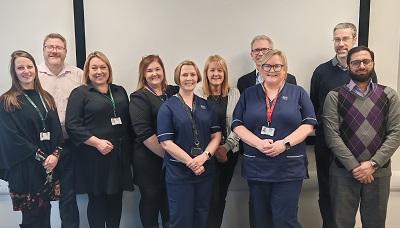
More than 26,000 people in Tayside are living with diabetes. NHS Tayside is significantly transforming the way that people with diabetes receive their regular blood tests and screening appointments.
This new approach aims to deliver care closer to home; ensuring patients receive the right tests at the right time from the appropriate healthcare team.
The redesign of diabetes monitoring services across the Tayside region will bring care closer to home, enhancing both patient experiences and health outcomes. All individuals with diabetes, regardless of type, will now attend their blood test and monitoring appointments at their local GP practice or Community Treatment and Care Service, reducing the need for unnecessary hospital visits.
Following their blood tests and monitoring appointments, patients will receive care tailored to their results. Those requiring further assessment or support from hospital-based specialist care teams will be offered review appointments, either in person or via telephone or video consultations, depending on what best suits their needs. Patients whose results indicate no need for hospital care will continue to be managed by their GP practice.
This change brings numerous benefits to patients, including reducing waiting times for hospital appointments and cutting unnecessary travel, aligning with NHS Tayside's commitment to environmental sustainability.
Lynn Smith, NHS Tayside Chief Officer, Acute Services, said, “By bringing care into local communities, we’re reducing travel, cutting waiting times, and improving the overall patient experience. This is a significant step forward in delivering person-centred, efficient and sustainable care for those living with diabetes.”
A pilot study of this new approach has been successfully underway in Perth & Kinross in recent months, with many patients already benefitting from local screening. Patients have appreciated the convenience of appointments at local Community Treatment and Care Service locations or at their GP practices, rather than travelling to Perth Royal Infirmary or Ninewells Hospital.
Christine Craig who lives with diabetes said, “It is easier for me to get to the Bridge of Earn hub as I do not drive. I prefer coming to the hub as it is closer to home.”
The rollout of this new service to all GP practices and community treatment and care services across Tayside is expected by early 2025.
Professor Ewan Pearson, NHS Tayside’s clinical lead for secondary care diabetes, said, “We are excited to be rolling out this innovative approach to diabetes care in Tayside. The new diabetes care pathway will fully coordinate care between the GP and secondary care team, minimise duplication and ensure patients receive the most appropriate care for their needs”.